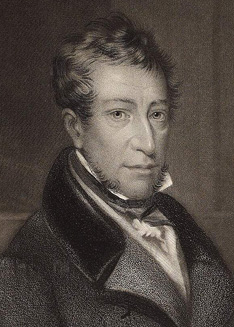| Profile | Major Works | Resources |
George Pryme, 1781-1868.

First professor of economics at Cambridge University.
Originating from a merchant family in Yorkshire, George Pryme enrolled in Trinity College, Cambridge, in 1799. He graduated in 1803 and was elected fellow of Trinity in 1805. He started off a career as a lawyer, enrolling at Lincoln's Inn in London in 1804. But poor health eventually forced him to abandon his practice and return to Cambridge. Although his health improved, Pryme stayed in Cambridge as a country lawyer, and got married in 1813.
George Pryme was hired in 1816 to lecture on political economy at Cambridge University. These were arguably the first lectures dedicated to political economy at Cambridge (William Paley had included political economy as part of his "moral and political philosophy" lectures back in 1770s; William Smyth had incorporated economic topics in his lectures on Modern History after 1807). The initiative was apparently Pryme's own - the debate over the corn laws and the bullion resumption were at their height, and public interest was high. Pryme sketched out a syllabus and submitted the request. The university's vice-chancellor John Kaye (master of Christ's College) approved, but scheduled the lectures in the afternoon, so as not to interfere with the "real" college lectures.. He was not paid a regular salary, but had to collect fees from the students (usually less than £30 per year).
The lectures began on March 1816, with some 45 attendees. Pryme's lectures were "intended to facilitate the study of a science, hitherto inaccessible without the most arduous perseverance", and covered "the original and efficient causes of national prosperity, to shew by what measures of the legislature, and by what conduct of individuals in private life, it is augmented and diminished." It was a very elementary course, Pryme judiciously avoiding any polemics (he apparently relied on Smith and Steuart).
But Pryme was a dull lecturer and the topic receded in public interest. As attendance waned, Pryme lectures were confined to alternate years. In 1825, Oxford University instituted the Drummond chair in political economy. A similar plan had been hatched by William Huskisson for Cambridge, but only on the condition that it go to someone other than Pryme. Nonetheless, Pryme's administrative services to the university made him hard to exclude and the plan sunk. Still, unwilling to be left behind by Oxford, the Cambridge senate finally decided to formally create the title of "Professor of Political Economy" for George Pryme on May 27, 1828. It was a mere title, with no additional responsibilities nor emoluments.
Pryme's appointment to the chair in 1828 was opposed by William Whewell, soon to become the master of Trinity College and arguably the dominant force at Cambridge during these decades. Whewell had little respect for Pryme, and perceived him as an obstacle to introducing proper economics in the university.
And Pryme was distracted. He maintained his legal practice throughout his tenure, and was heavily involved in local town politics since at least 1820. At the time, the town of Cambridge was effectively a rotten borough, controlled by the Duke of Rutland. But the 1832 Parliamentary reform opened it up, and Pryme and was elected as Cambridge town's first member of parliament in 1832, as a Whig for Cambridgeshire (Thomas Spring Rice was elected as fellow delegate). Pryme retained the seat until 1841.
George Pryme was still holding the economics chair in 1848, when Cambridge was persuaded to introduce the "Moral Science Tripos" in 1848, including political economy as one of the subjects of honors examinations.
After nearly a half-century of lecturing, Pryme finally retired in 1863, partly in an effort to force Cambridge to make the professorship into a permanent chair (Letters of 1861-63). Cambridge senate finally went with it on October 29, 1863, approving a permanent chair with a salary of £300. Pryme resigned the next day and was succeeded by Henry Fawcett.
|
Major Works of George Pryme
|
|
HET
|
|
Resources on George Pryme
|
All rights reserved, Gonçalo L. Fonseca
